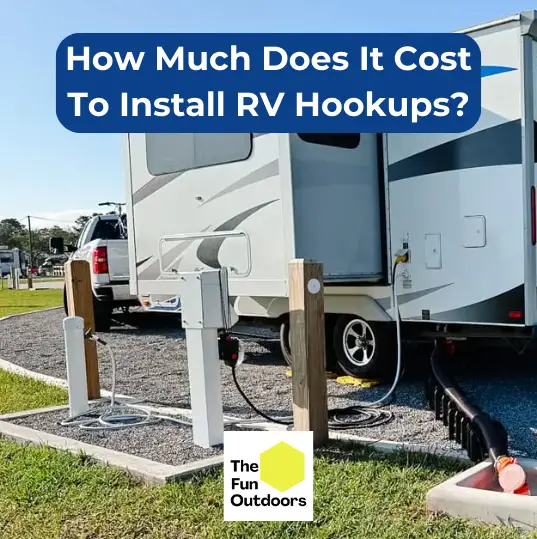RV camping is a popular way to travel and explore the great outdoors. However, to fully enjoy the experience, RV owners need to have access to hookups for water, electricity, and sewer. Installing RV hookups can be a daunting task, especially for those who are new to RV camping. One of the most important factors to consider is the cost of installation.
The cost to install RV hookups can vary from $550 to $13,000 depending on whether you do it yourself or hire a professional and the materials you use. We’ve outlined the RV hookup costs for water, electric, sewer, and parking pads below:
| RV Hookup | DIY Cost | Professional Install Cost |
| Water Hookup | $50 | $750 |
| Electric Hookup | $100 | $1,250 |
| Sewer Hookup | Free | $6,000 |
| Parking Pad | $400 (Gravel) | $5,000 (Cement) |
| Total Cost | $550 | $13,000 |
Key Takeaways
- The cost of installing RV hookups can vary widely ($550 to $13,000) depending on several factors.
- Installing RV hookups involves several types of installations, including water, electricity, sewer, and parking pad.
- RV owners can save money by doing some of the work themselves, but it is important to understand the costs and risks involved.
Which RV Hookups Do I Need?
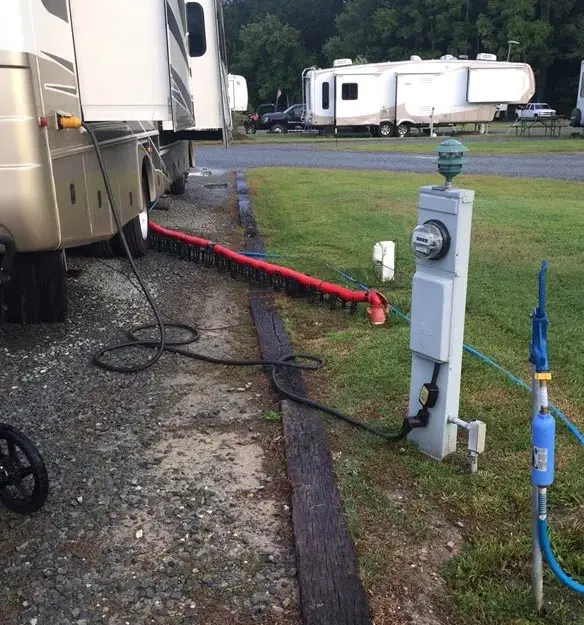
RV hookups are essential for any RV owner who wants to make the most of their vehicle. These hookups provide access to electricity, water, and sewer services, making it possible to live comfortably while on the road. However, installing RV hookups can be a costly and complex process, so it’s important to understand what’s involved before getting started.
Types of RV Hookups
There are three main types of RV hookups: electric, water, and sewer. Each hookup serves a different purpose and requires different equipment to install.
- Electric Hookup: An electric hookup provides power to the RV. It typically involves installing a 30-amp or 50-amp electrical outlet, which can be done by a professional or DIY. The cost of installation can vary depending on whether the RV owner chooses to hire a professional or do it themselves.
- Water Hookup: A water hookup provides fresh water to the RV. This hookup typically involves installing a water hose connection, which can be done by a professional or DIY. The cost of installation can vary depending on the size of the RV and the amount of water needed.
- Sewer Hookup: A sewer hookup provides a way to dispose of waste from the RV. This hookup typically involves installing a sewer hose connection, which can be done by a professional or DIY. The cost of installation can vary depending on whether the RV owner chooses to use a current sewage disposal system or install an RV-specific septic tank.
- Parking Pad: The parking pad is necessary, but materials can vary from cheap (gravel) to expensive (professionally poured cement). You can also install the cement yourself for a cheaper but better-looking option.
Cost of Installing RV Hookups
The cost of installing RV hookups can vary widely depending on the type of hookup, the size of the RV, and the amount of work required. The cost to install an RV electric hookup can range from around $1,200 for a professional install to almost nothing for a DIY install. The cost to install a water hookup can range from $300 to $2,000 depending on the RV size and other factors. The cost to install a sewer hookup can range from free or extremely cheap for use of a current sewage disposal system to $2,000-$3,000 for an RV-specific septic tank.
DIY vs. Professional Installation
RV owners can choose to install RV hookups themselves or hire a professional to do the job. DIY installation can save money, but it requires a certain level of skill and knowledge. Professional installation can ensure that the job is done correctly and safely, but it can be more expensive.
Cost Factors of Installing RV Hookups
When it comes to installing RV hookups, there are several factors that can influence the cost. In this section, we will discuss the two major cost factors: materials and labor costs.
Materials Costs
The materials costs for installing RV hookups can vary depending on the type of hookup you need. For example, if you are installing an RV electric hookup, you may need to purchase electrical wiring, a breaker box, and other materials. On the other hand, if you are installing an RV sewer hookup, you may need to purchase a septic tank or connect to an existing sewage disposal system.
The cost for an RV-specific septic tank can range from $2,000 to $3,000. However, if you have access to a current sewage disposal system, you may be able to use it for free or for a very low cost.
The cost for an RV electric hookup can also vary depending on whether you hire a professional electrician or do it yourself. You can expect to pay $1,000 to $1,500 for an electrician to install an RV electric hookup. However, if you are comfortable with electrical work, you may be able to do it yourself for almost nothing.
Labor Costs
The labor costs for installing RV hookups can also vary depending on whether you hire a professional or do it yourself. The cost for a professional to install RV hookups can range from $550 to $13,000. However, if you are comfortable with DIY projects, you may be able to save hundreds or even thousands of dollars by doing the installation yourself.
It is important to note that the labor costs can also vary depending on the complexity of the installation and the location of the hookup.
If you need to install an RV electric hookup in a remote location, the labor costs may be higher due to the difficulty of accessing the site.
RV Pad Installation
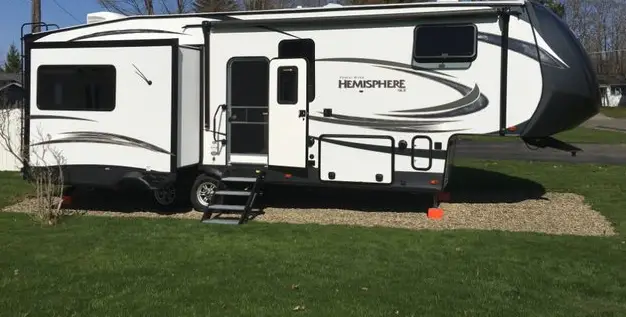
Installing an RV pad is the first step in setting up RV hookups, and the cost varies depending on the material and size of the pad. It’s important to have a level and stable surface to park the RV and prevent any damage. Plan on your pad being 4 feet longer and wider than your RV.
Choose Your Material
There are several materials to choose from when building an RV pad, including concrete, asphalt, and gravel. Concrete and asphalt are more expensive but provide a more durable and long-lasting surface. Gravel is a more affordable option but requires more maintenance and may not be suitable for all climates.
| RV Pad Material | Cost per Square Foot |
| Concrete | $6-$15 |
| Asphalt | $3-$6 |
| Gravel | $1-$3 |
Install A Post For Your Hookups
Once the RV pad is installed, the next step is to install a post for the hookups. This post will include the electrical, water, and sewer connections for the RV. The cost of the post will depend on the number of hookups and the distance from the main source.
Also, be sure that you install your post on the proper side of your RV where you’ll need the hookups to be! This is extremely important.
You can use a 4×4 or 6×6 post, and consider going a little higher than 4’ tall- 6’ 8’, or 10’ is great.
You’ll need to dig a hole about 8-10” wide and about 30” deep to set the post in.
Level the post and set with concrete.
At-Home RV Water Hookup Installation
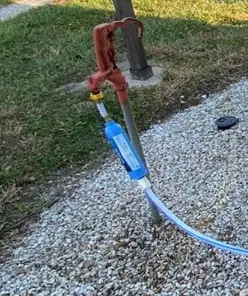
Installing an RV water hookup at home can be a great way to save money on camping trips. While it may seem like a daunting task, it can be done with a little bit of effort and some basic tools. Here are some steps to consider when installing an RV water hookup at home.
Dig Your Trench Below The Frost Line
Before starting the installation process, it is important to dig a trench for the water line. The trench should be dug below the frost line to prevent freezing during the winter months. The depth of the frost line varies depending on the location, so it is important to check with the local utility company to determine the appropriate depth.
Install CPVC Pipe
Once the trench is dug, it is time to install the CPVC pipe. CPVC is a type of plastic pipe that is commonly used for water lines. It is lightweight, easy to work with, and resistant to corrosion. The pipe should be installed in the trench and connected to the main water supply line. It is important to use the appropriate fittings and connectors to ensure a tight seal.
Backfill The Trench
After the pipe is installed, it is time to backfill the trench. The trench should be filled with dirt and compacted to prevent settling. It is important to leave a few inches of space at the top of the trench to allow for the installation of the water hookup.
At-Home RV Electric Hookup Installation
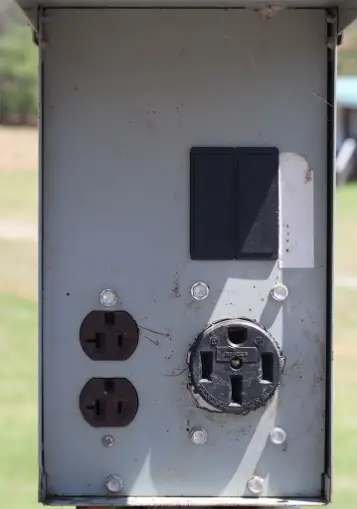
Installing an electric hookup for an RV at home can be a cost-effective way to ensure a comfortable stay for the traveler. The cost of installing an electric hookup for an RV at home can range from $425 to $1,200 depending on how much of the physical labor you’re willing to do.
Before starting, you’ll want to know whether your RV is uses a 30-amp or 50-amp plug, and whether or not you’re installing additional services like cable or phone lines.
Install the breaker box on the post, then trench from the power source to the post so you or the contractor can run the electric lines to the rv spot.
Once the work is done, backfill the trench.
Add A Surge Protector
It is essential to add a surge protector to the RV electric hookup to protect the RV’s electrical system from voltage spikes and surges. A surge protector can prevent damage to the RV’s electrical system and appliances.
Consider the amperage rating of the RV’s electrical system when choosing a surge protector. RVs typically come with either a 30-amp or 50-amp electrical system. A 30-amp surge protector can handle up to 3,600 watts, while a 50-amp surge protector can handle up to 12,000 watts.
Some surge protectors are designed to be plugged directly into the RV’s electrical system, while others are designed to be plugged into a pedestal or power outlet, so keep this in mind when picking one out.
It is recommended to use a surge protector with a built-in diagnostic feature that can alert the RV owner if there is a problem with the electrical system.
You should also consider other electrical components such as a circuit breaker and a ground fault circuit interrupter (GFCI). A circuit breaker can protect the RV’s electrical system from overloading, while a GFCI can protect the RV owner from electrical shock.
Sewer Hookup Installation
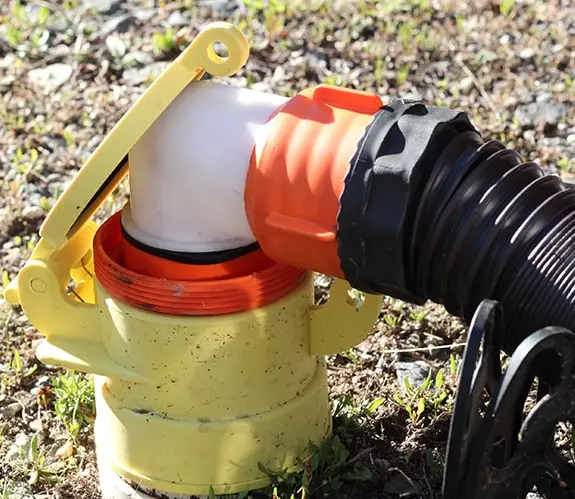
Installing a sewer hookup for an RV is an important step in setting up a comfortable and functional living space. There are a few different options available for sewer hookup installation, depending on the location and needs of the RV owner.
Hook Up Your RV To A Public Sewer System
One of the easiest and most convenient options for RV sewer hookup is to connect the RV to a public sewer system. This requires finding a location that offers public sewer access.
Once the RV is parked in a designated spot, a sewer hose can be attached to the RV’s waste outlet and connected to the public sewer system hookup. This option is typically the most cost-effective and low-maintenance solution for RV sewer hookup.
Hook Up Your RV To A Private Septic System
If public sewer access is not available, RV owners may need to consider hooking up to a private septic system.
You’ll need to purchase a septic hose and adapter, and connect it to the RV’s waste outlet and the septic system hookup. This option can be more expensive and may require more maintenance, as the RV owner will need to ensure that the septic system is properly maintained and emptied as needed.
Add An In-Ground Septic Tank For Your RV
For those who plan to park their RV on their own property for an extended period of time, adding an in-ground septic tank may be the best option. This requires hiring a professional to install a septic tank that is specifically designed for RV use. The septic tank will need to be connected to the RV’s waste outlet using a septic hose and adapter. This option can be more expensive upfront, but can provide a long-term solution for RV sewer hookup that is convenient and low-maintenance.
Professional Assistance
When it comes to installing RV hookups, many people choose to hire a professional to ensure that the installation is done correctly and safely. A professional can help with all aspects of the installation process, from site preparation to electrical and plumbing work.
The cost of hiring a professional for RV hookup installation can vary depending on the location, the type of hookup, and the level of expertise required. Typically, an electrician will charge around $1,000 to $1,500 to install an electrical hookup, while a plumber may charge around $500 to $1,000 for a water hookup. If you need both electrical and water hookups installed, you can expect to pay around $2,000 to $3,000 in total.
In addition to electricians and plumbers, you may also need to hire a contractor to help with site preparation and other aspects of the installation process. A contractor can help with tasks such as leveling the ground, installing a septic tank, and laying concrete pads. The cost of hiring a contractor can vary widely depending on the scope of the project, but you can expect to pay anywhere from $2,000 to $10,000 or more.
Overall, hiring a professional can be a good option if you want to ensure that your RV hookup installation is done safely and correctly. However, it is important to do your research and choose a reputable and experienced professional to work with. You may also want to get multiple quotes from different professionals to ensure that you are getting a fair price for the work.
Additional Considerations
When installing RV hookups, there are a few additional considerations to keep in mind. These include the RV parking pad cover and landscaping.
RV Parking Pad Cover
The RV parking pad cover is an additional convenience that will help keep the weather elements from beating down on your RV, keeping your RV cooler during the summer and preventing you from having to install an RV winter cover.
An RV parking pad cover will provide tons of convenience if you plan on keeping your RV up year-round.
Landscaping
Landscaping is another consideration when installing RV hookups. It is important to ensure that the area around the RV parking pad is level and free of obstacles that could damage the RV.
If you plan on making the RV a permanent fixture, you’ll need to consider the cost of long-term landscaping into your project budget.
Frequently Asked Questions
To install RV hookups, you can simply hire a licensed professional plumber, electrician, or contractor. It’s important to choose someone who has experience with RV hookups and understands the specific requirements for RVs. You can search for local professionals online or ask for recommendations from other RV owners.
The requirements for permits vary depending on your location and the specific type of hookup you are installing. In general, you may need a permit for electrical or plumbing work, but there’s typically no RV-specific permits to worry about.
Check with your local government to determine what permits are required and to ensure that you are in compliance with any regulations.
While it is possible to install RV hookups yourself, it is recommended that you hire a professional. RV hookups require specialized knowledge and expertise to ensure that they are installed correctly and safely. A professional can also help you determine the best location for your hookups and ensure that you have all the necessary equipment and materials.
The time it takes to install RV hookups can vary depending on the type and complexity of the hookup. If you’re installing a parking pad, electric, water, and sewer, plan on it taking a week or two to get everything done.
Factors that can affect the installation time include the location of the hookup, the size and type of RV, and any necessary permits or inspections. Be sure to discuss the timeline with your installer before beginning the process.

